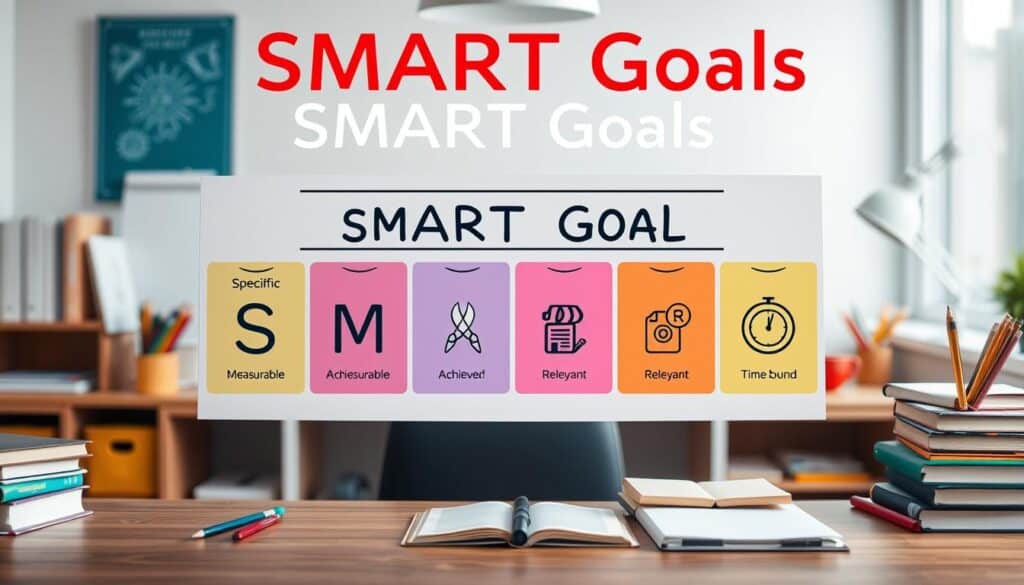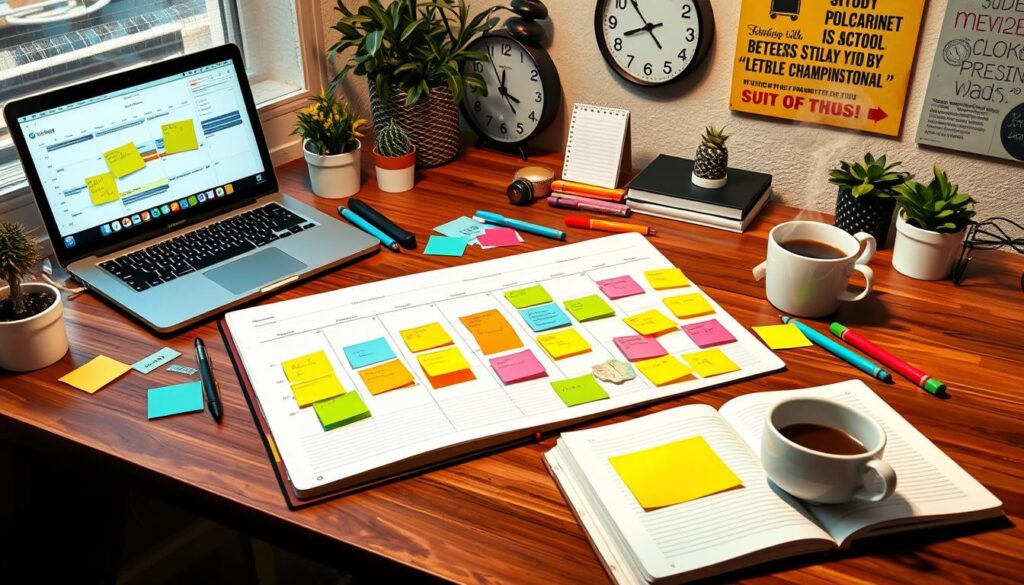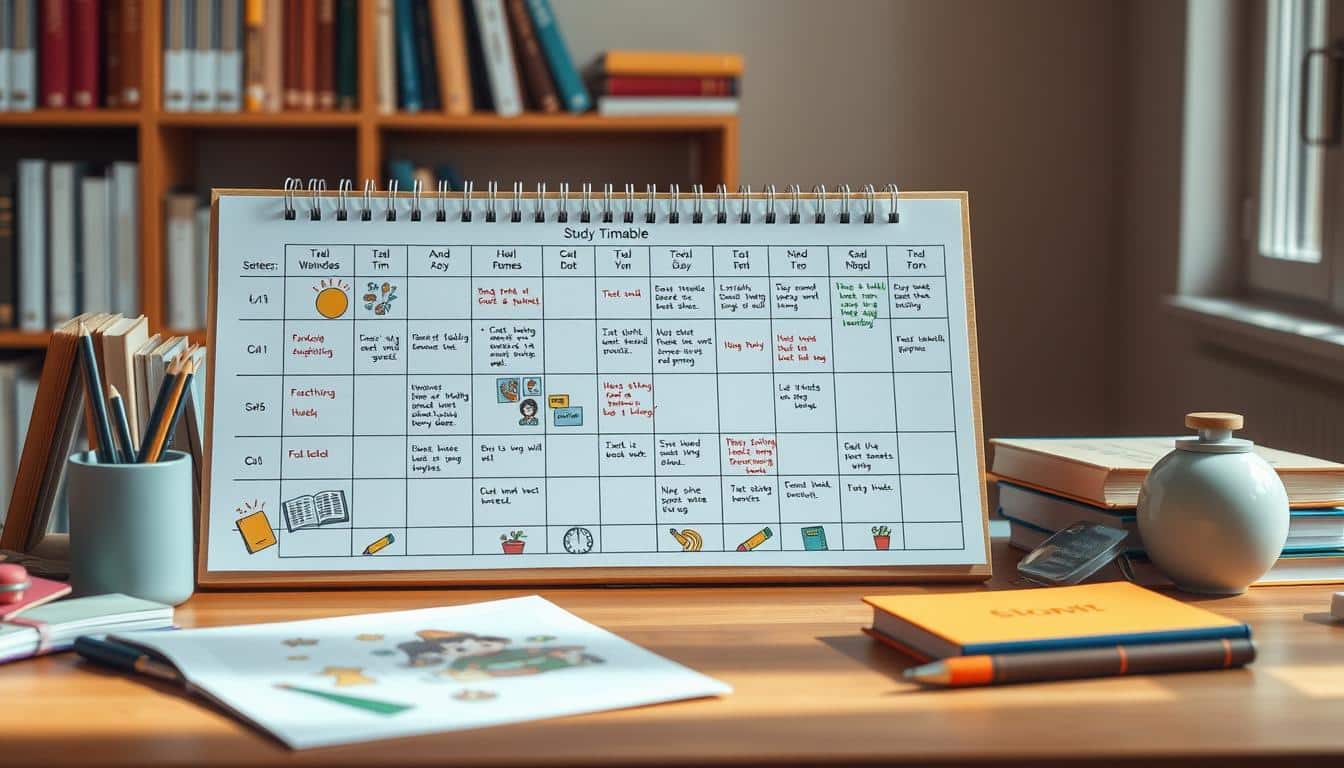Making a good study timetable is key to doing well in school. Start by setting both short-term and long-term goals. Short-term goals might be passing a test soon or finishing a paper in a couple of weeks. Long-term goals could be getting into a top college or landing a dream job.
It’s important to know when these goals are due. Break them down into smaller tasks for each day, week, and month. This makes them easier to handle.
Make a list of all your school subjects and what you need to do for each. This helps you see what you need to focus on. Knowing your school work well lets you plan your study time better and feel less stressed.
Key Takeaways
- Establish short-term and long-term academic goals to guide your study timetable.
- Break down your goals into daily, weekly, and monthly tasks for better time management.
- Identify all your subjects and coursework to prioritize and allocate study time effectively.
- Crafting a structured study timetable enhances productivity and reduces stress.
- Personalize your study timetable to suit your learning style and preferences.
Understand Your Learning Style
Knowing your learning style is key to making a good study plan. Everyone learns differently. Finding out how you learn best can really help you.
Visual Learners
Visual learners do well with pictures and colors. They like using flashcards and diagrams. Watching videos and making mind maps also helps them.
Auditory Learners
Auditory learners get information better when they hear it. They do well in study groups and by listening to lectures. Reading notes out loud also helps them.
Kinesthetic Learners
Kinesthetic learners learn by doing. They like role-playing and moving around. Using models and experiments helps them understand complex ideas.
Knowing your learning style helps you study better. Try different ways to learn and find what works for you. Being open to new methods makes you a better learner.
Set Clear Goals

Setting clear, achievable goals is key to a good study plan. Start with a big goal: passing the exam. Then, break it down into smaller steps. Short-term goals might be finishing a chapter or mastering a topic each week.
Medium-term goals could be doing several practice tests or improving in weak areas by the study schedule’s midpoint. Your main long-term goal is to be fully ready for the exam by the test date.
Define Your Objectives
Start by knowing what you want to achieve. Do you want to get better at a subject, raise your GPA, or just pass the exam? Setting clear goals helps you see how far you’ve come and keeps you motivated.
SMART Goals
Use the SMART framework (Specific, Measurable, Achievable, Relevant, Time-bound) for better goals. For instance, a SMART goal might be: “Finish 100 practice questions in human development by the end of the week and score 80% or higher.” This goal is clear, measurable, doable, relevant, and has a deadline.
Adding SMART to your goals makes your study plan focused, realistic, and aimed for success.
| SMART Goal Element | Description |
|---|---|
| Specific | The goal should be clear and well-defined, with a specific outcome in mind. |
| Measurable | The goal should have quantifiable metrics or milestones to track progress. |
| Achievable | The goal should be realistic and within your capabilities to accomplish. |
| Relevant | The goal should align with your overall study objectives and be meaningful to your exam preparation. |
| Time-bound | The goal should have a clear deadline or timeline for completion. |
By setting clear goals and breaking them into SMART steps, you make a focused study plan. This plan will help you succeed academically.
Choose the Right Study Tools

Mastering your studies is more than just reading books and going to class. To get ready for exams, you need different study tools. These tools should fit your learning style and needs. From books and guides to online courses and practice tests, the right tools can really help you succeed.
Textbooks and Study Guides
Textbooks and study guides are key for a deep understanding of exam topics. They offer detailed explanations, practice questions, and outlines. By using these, you can strengthen your grasp of important concepts and see where you need to focus more.
Online Courses
Online courses, like those from Agents of Change, are very helpful. They offer study plans, video lessons, and forums for discussion. These tools let you customize your learning and stay interested in your studies.
Practice Tests
Doing full-length practice tests is crucial. They let you get used to the exam setting, find weak spots, and learn to manage your time. By practicing, you build confidence and make sure you can finish the test on time. This feedback helps you improve your study methods and get better before the actual test.
| Study Tool | Key Benefits |
|---|---|
| Textbooks and Study Guides |
|
| Online Courses |
|
| Practice Tests |
|
“The right study tools can make a significant difference in your preparation.”
Study Timetable: Create a Realistic Timeline

Making a good study timetable is crucial for success. First, figure out your exam date. Then, count back to find when to start studying. Break your time into smaller parts for different subjects and tasks.
Try to study every day, like an hour each day. Also, set weekly goals to keep moving forward. Use weekends for longer study sessions to get into tough topics. This keeps you focused and avoids feeling too stressed.
- Set a specific exam date as the endpoint for your study timetable.
- Work backward from the exam date to establish a realistic start date for your study plan.
- Allocate time for daily study sessions, typically around an hour per day, to build consistent habits.
- Incorporate weekly goals to track your progress and ensure you’re covering all the necessary material.
- Dedicate longer study blocks, such as on weekends, to tackle more challenging topics or dive deeper into the subject matter.
Being flexible is important. Check and change your study plan often to keep it working well. Taking breaks, getting help, and keeping a good study space can also help a lot.
“One hour spent soon after class is as effective as several hours spent a few days later.” – Learning expert
With a good study timetable, you can work better, feel less stressed, and do well on exams. Use a well-made study plan to improve your grades.
Balance Study with Life

It’s tough to balance study time with life, but it’s key for your well-being and success. You must prioritize and take breaks to avoid burnout.
Prioritize Your Commitments
First, list all your commitments like work, family, and social activities. Then, figure out what can’t be changed, like family events. Schedule these first, and then fit in study time.
If exams are coming up, you might need to skip some social activities. But remember, this is just for now. You’ll get back to those activities after your exams.
Schedule Breaks
It’s important to schedule breaks during your study sessions to avoid burnout. Take a 5 to 10-minute break every study block. Use this time to stretch, walk, or listen to music. Don’t make your breaks too long, as it can mess up your study plan.
- Aim for 8-10 hours of sleep per night to maintain productivity and focus.
- Incorporate at least 30 minutes of daily exercise to boost energy levels and improve sleep quality.
- Practice relaxation techniques, such as breathing exercises and muscle relaxation, to manage stress levels.
Keeping study and life in balance is vital to avoid burnout and stress. With good planning and strategies, you can succeed academically and take care of your well-being.
Optimize Your Study Environment

The place where you study greatly affects how well you do. Quiet spots like libraries, home offices, and calm cafes are perfect for deep focus. Here, you can wear noise-cancelling headphones and keep all your study stuff ready to avoid interruptions.
Quiet Spaces
Studying in quiet places helps you focus better and remember more. Studies show changing where you study can boost your memory. A peaceful spot lets you dive into your studies without distractions from loud or crowded places.
Noisy or Busy Environments
Sometimes, you may have to study in less than ideal conditions, such as a bustling coffee shop or public transport. In these situations, use earplugs or listen to white noise to block out distractions. Break your study tasks into smaller parts that need less focus. Flexible areas, like co-working spots or shared study rooms, offer both quiet and group settings. This lets you plan your study sessions based on the place’s noise and layout.
By improving your study environment, you can set up the best conditions for learning. Whether you like quiet or a lively atmosphere, there are ways to optimize your study time. This helps you do well in your studies.
Also Read : Intensive Study Plans For Exams: Tips For Efficient Learning
Conclusion
Creating a good study timetable is key to exam success. It involves knowing your learning style, setting goals, and choosing the right tools. It also means balancing study time with daily life. These steps help you make the most of your study time, stay productive, and pass exams with ease.
More than 10,000 students have seen their grades improve thanks to these strategies. A well-made study plan is crucial for success. It helps you perform better, reduces stress, and keeps information in your mind longer.
Using tools like online calendars and study apps can make planning easier. Students find that a study schedule helps them manage time, stay focused, and remember more. It also helps avoid procrastination and distractions, making studying more effective.
FAQs
Q: What is the best way to create a study timetable for exam success?
A: The best way to create a study timetable is to first assess the subjects you need to study and then allocate specific time slots for each subject in a timetable template. Ensure that your daily routine includes effective study techniques and breaks to enhance concentration.
Q: How can I make my study timetable effective?
A: To make your study timetable effective, incorporate a variety of study techniques, prioritize difficult subjects, and ensure that you schedule adequate revision time. Use a digital timetable or a free timetable template to easily adjust your schedule as needed.
Q: What should I include in my daily study routine?
A: Your daily study routine should include specific study hours for each subject, short breaks, and revision sessions. It’s also helpful to include study tips that cater to different subjects to maximize your study time.
Q: How can I stay on top of my study plan?
A: To stay on top of your study plan, regularly review and adjust your timetable for studying based on your progress. Use reminders and checklist apps to keep track of your completed tasks and upcoming study sessions.
Q: Can I use a timetable template for different subjects?
A: Yes, a timetable template can be customized for different subjects. You can create a study timetable that reflects the time needed for each subject, ensuring you allocate enough time to areas where you might need extra focus.
Q: What are some tips for creating a study timetable?
A: Some tips for creating a study timetable include starting with a draft timetable, identifying peak study times when you’re most alert, and incorporating a mix of study methods. Don’t forget to leave some flexibility for unexpected events.
Q: Why should I use a digital timetable for my studies?
A: A digital timetable allows for easy adjustments and quick access to your study plan from anywhere. You can also set reminders and notifications to help you stick to your study schedule, making it easier to create your study timetable.
Q: How can I manage my study time effectively during exam preparation?
A: To manage your study time effectively, break your study sessions into manageable chunks, prioritize high-impact subjects, and use a timetable for students that balances study and revision time. This approach will help you study less while achieving better results.
Q: What is the importance of having a study timetable template?
A: A study timetable template provides a structured format to plan your study hours efficiently. It helps you visualize your study routine, ensures you cover all subjects, and keeps you accountable for your study habits.
Q: How do I make a study timetable that works for me?
A: To make a study timetable that works for you, assess your current study habits, identify your peak productivity times, and customize a template that fits your schedule. Regularly review and adjust it based on your progress and needs.
Source Links
- https://www.stetson.edu/administration/academic-success/media/STUDY SCHEDULE.pdf
- https://www.allenoverseas.com/blog/how-to-plan-your-study-hours-smartly/
- https://www.laureateshimla.com/exam-study-timetable-for-guaranteed-success/
- https://review.gale.com/2023/01/03/knowing-your-learning-style-can-supercharge-your-studies/
- https://flexcollegeprep.com/study-tips-for-different-learning-styles/
